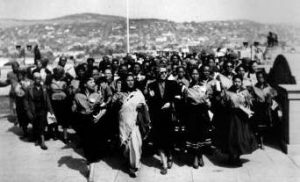Communism Will End Racism, Sexism and Wage Slavery

In South Africa, Women’s Day (August 9) commemorates the march of thousands of women to Pretoria’s Union Buildings in 1956 in protest against apartheid’s pass laws that sought to restrict the movements of non-white South Africans. (See box below)
A woman comrade begins the history:
In 1956 thousands of South African women stood up and said enough was enough. Things were very bad. Black South Africans had to carry identification anywhere they went. And there were places that were no-go areas for Black women. White men could do whatever they wanted and there would be no consequences. It is all thanks to the women that the law of identification was lifted. Women like Lillian Ngoyi, Albertina Sisulu, and Helen Joseph, despite the color of their skins, got up and took a stand. That is where the phrase, “You strike a woman, you strike a rock” came from.
Another member, a man, takes up the account:
In1956 women from all walks of life in South Africa marched to demand an end to apartheid. My mother was involved in this march. She was sixteen years old and went with my grandmother. They marched 20 kilometers (12 miles) from one area down to catch a train to Johannesburg. From there they marched around 300 kilometers (180 miles) to the Union Buildings in Pretoria.
Women were coming from all over the place: from rural areas, urban areas. Some of their husbands were staying in places like Johannesburg where they worked in the mines, so they were directly affected by the system. They took the decision to demand an end to apartheid and an end to the pass laws.
This was a significant event. Apartheid was known for its brutality and intolerance to opposition and for the force with which they suppressed dissent. So for women to stand up and demand an end to that injustice was significant because the women in this society are characterized as objects, as weak, fragile and emotional. The march showed again that this is untrue.
My mother was lamenting that it was more than 50 years ago but we’re still talking about the same things now. Men think they can literally buy women or they can do whatever, touch them wherever they want if they feel like it.
This is not just an attitude of men; this is an attitude that is perpetuated by the capitalist society we live in. For this to change, for the dreams or aspirations of 1956 to be realized, we need full emancipation. This means the eradication of capitalism because sexism, like racism, grows with capitalism. For it to fall, capitalism has to fall.
I tell my mother that what was lacking then is what we are providing now: the communist outlook, communist leadership to the working class. If they had organized and mobilized around communism, things would be different today.
We see what is happening now. These are the symptoms of the system we are living in. I don’t think it is wise for us to fight only against the symptoms, like the #metoo movement does. The important thing is to fight the disease: capitalism.
Once we do that, we will destroy the material basis of sexism, which is capitalism. Then half the battle will be won against racism, sexism, and corruption. It is imperative for the emancipation of women for us to destroy capitalism and replace it with a truly just and equal society: communism.
In communism women will be involved in production and also in the distribution of production. Both men and women will be involved in domestic tasks. So the eradication of capitalism becomes primary in fighting sexism. Both now and in communism we will engage in ideological struggle against sexist views. All forms of sexism, racism, and other capitalist tendencies must not be tolerated and will not be tolerated by the workers under communism.
So this is what I told my mother. If they fought for communism things would change. It is not too late to fight for communism because women all around the world are talking about the same thing. And it is our job in ICWP to organize all workers, including all women all around the world, to fight and defeat capitalism and build a new communist society.
The Legacy of Apartheid
Apartheid’s laws divided the country into different areas for different racial groups. Black people were supposed to live in “homelands” which included some of the most barren deserts of the country. To survive, the men had to find jobs in the mines and factories, which were in the white areas. They had to carry passbooks at all times which included their employer’s name.
In 1955 the government passed a law to require women to carry passbooks. This meant that unless a woman had a job, she couldn’t join her husband in the city. In 1956 20,000 women marched to Pretoria to present their demands.
Although the apartheid system and its passbooks were eliminated in 1994, capitalism and its brutal exploitation remain. Men are forced by capitalism to leave their families in the countryside to seek jobs in the factories and mines. In Rustenburg, there are thousands of such men working in the mines and living in hostels. They can only return to their families in the countryside on holidays.

